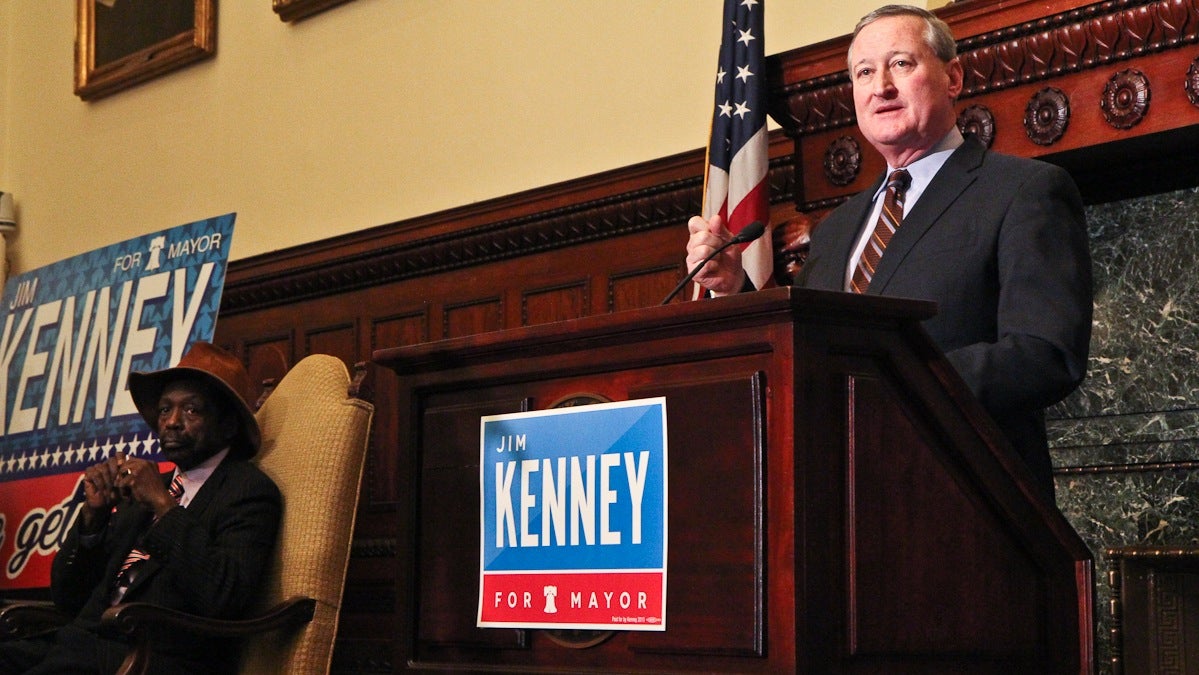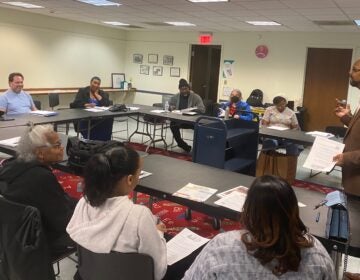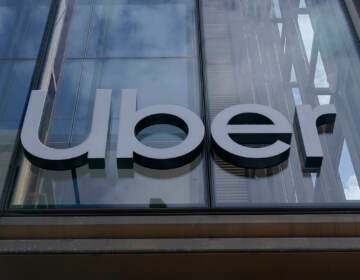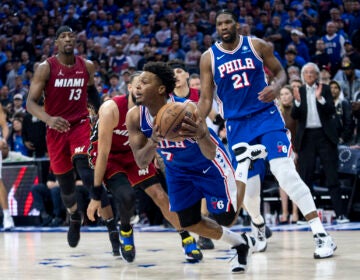Jim Kenney tells NinetyNine about friends, former foes and fundraising calls

Jim Kenney told NinetyNine that politics weren't always his calling. In fact, he wanted to get a law degree. (Kimberly Paynter/WHYY)
Three Wednesdays ago, Jim Kenney launched his mayoral run during an event on the second floor of City Hall, just steps away from where his office would be should he win in May and November.
So, we wanted to check in to see how the transition from 23-year City Councilman to mayoral candidate was going.
In his spare half hour between the Business Association of West Parkside’s mayoral forum and Black History Awards Luncheon at the Union League, Kenney spoke about a wide array of topics ranging from his political roots to race and the evolution of South Philly.
Learning a similar lesson that Citified faced not too long ago, conversational supply demanded a two-part presentation. What follows is part one.
Q&A
NinetyNine: Why did you opt to run for an at-large seat instead of for district councilman when you first got into public service 23 years ago?
Jim Kenney: “[Former First District Councilman Jimmy] Tayoun was in trouble; he had to leave office and there was a discussion about who would replace him. It wound up being Joe Vignola. My supporters and advisers at the time were telling me to run for the district. I didn’t want to run for the district.
Now, I have nothing against the district. I love the district. I live in it. But, I thought it would be more of an opportunity to see the city that I’d lived in my whole life from a different perspective, and be responsible for dealing with issues that were affecting various neighborhoods that were somewhat similar, but also different that things that were happening in the first district.
All the people who live in the city have similar goals, similar desires, but there are certain nuances of every neighborhood that you have to be aware of, knowledgable of, in order to be effective in representing them.
One of the things that I take most pride in is that I’ve been able to represent multiethnic, multiracial neighborhoods and can be considered a friend in each of them. I’ve never had an issue that’s put me on the wrong side, the bad side, of a racial or ethnic issue.
99: What do you think makes you that person?
JK: The Jesuits and my parents. My parents, growing up in a neighborhood that was not unfamiliar with the ‘n- word’ — not unfamiliar at all — that was not permitted in our home. Not by relatives, friends or anyone else. They were chastised for that kind of language in front of their children. That became an ongoing joke with their friends: ‘Ugh, I’m not allowed to say it.’ ‘Yeah, you’re not allowed to say it.’
I did the same thing with my kids. When I had folks that were less than politically correct, I would chastise them. I don’t want that being instilled in my children’s personalities.
Another thing I remember that Johnny Doc’s [IBEW business manager John Dougherty] father was a very good semi-pro basketball player. He used to take us to these men’s leagues in every neighborhood in the city, where we were the only white people in the place. We had a chance to interact with really big African American guys, who were athletes, and whoever else was there. They’d talk to you like anybody else would talk to you. They treated you nice. I mean, we were kids. We started to see that what you think of in your little insulated neighborhood about other people is not true at all, not even close to true.
99: I’d think South Philly insularity is stronger than what you’d find in other neighborhoods.
JK: In the 1960s and the 70s, it was, but not really anymore. South Philly is much more diverse than it’s ever been. From Southeast Asian ethnicity, to younger hipster/grungers, to young families, to an LGBT population that’s grown there, around Passyunk Avenue and Second Street, I think it’s a much more diverse place than it used to be.
But at the time I was growing up, neighborhoods were clearly demarked. When you were a teenager, you kind of had to run through a certain neighborhood and, sadly, some kids had to run through our neighborhood and not get caught up in stuff. That’s pretty much gone.
It was a stressful time back then. Vietnam. Civil rights. All sorts of stuff. It was a much higher-intensity atmosphere.
We were in our little enclave, the ‘Irish Ghetto’ as people like to say, and people didn’t go in and out of it as easily.
In South Philly, we had an Irish neighborhood, a Jewish neighborhood but by the late 60s early 70s they were gone, it became an African American neighborhood, some Hispanic, and then when you got west of Ninth Street, it was all Italian.
And you had to run through that neighborhood too (laughs). The Irish kids had to run through there. It didn’t happen a lot, but you had to be aware of where you were.
99: What do you think changed that?
JK: Being more mature and understanding that people are human beings. You might have your differences but those little kids who are black, Hispanic, Asian are the same as our little kids. It’s something that’s not such a clear delineation anymore.
Plus, you have popular culture. I think sports and music have brought races together. When you see an African American kid wearing a Flyers jersey, you wouldn’t have seen that in the 70s because they didn’t appeal to them. They appealed to white kids in South Philly, the Northeast and Delaware County. You see more interaction now with kids in different sports, certainly in music. That has kind of melded kids together. I don’t think younger people are as racially segregated in their mindsets as, perhaps, our generation, and the generation before that, were.
Things have improved. Certainly they’re not perfect. But they’ve improved.
99: Was politics always your path?
JK: No. I’d always thought about going to law school and never did get around to it.
99: Is that something you regret?
JK: Yeah. I regret it because it diminishes your ability to make a living. If I had a law degree and could hook up with a law firm, while you’re running for mayor, you’re in pretty good shape.
I’m fine. I’m not complaining. But it would have been, if you lose an election, you can always go hang your shingle up somewhere.
It’s not a regret I consider every single day. It’s just every now and then, ‘Oh, I wish I had that license. I could do more.’
99: I’d thought you might have been in student government and lost an election of some sort, because you’ve never lost one for council, right?
JK: I wasn’t involved in student government in high school or grade school. It wasn’t a blinding passion of mine. I volunteered in ’78 in South Philly, a constituent’s services office and enjoyed it.
I volunteered for two years, went on staff in 1980 and still enjoyed it. That was the base of government/public service nitty-gritty trash, potholes, broken inlets, real-estate tax issues, real-estate rebates for seniors, prescriptions, all those types of things. I did all that. I sat in an office with an older or younger person, took their complaints, made the calls and got things fixed.
99: You talk a lot about your father, a firefighter. Why not go that path?
JK: I don’t remember him overtly pushing us away from it. But, I think it was more ‘Go the Prep. Go to college.’ It wasn’t something that I thought of doing. I admired what he did, and admired the people he worked with, but it never really occurred to me to be one.
My son [works] in probation and parole now, as a criminal-justice major. I always secretly wished he’d take the [firefighters’] test, but he had no interest.
99: What about him getting into politics?
JK: Noooo. I wouldn’t recommend that for my children. They’re more private people and this is a very sometimes-difficult business. I came into politics in the late 70s and which was a much different atmosphere than it is today.
99: How so?
JK: I think the party and the ward structure had a lot more influence. It still does at some levels of elections, judicial — even state-house — elections. People watch television and look at commercials [related to] campaigns for Congress, U.S. Senate, mayor and governor. There’s not the same influence that a committeeperson has on a constituent of theirs.
A lot of that has to do with changes in government. Civil-service took away a lot of patronage. The ability of the ward to raise money was taken away by some state and federal legislation. Which was all well and good. No complaints about it. But the whole system of ward politics has been devolving for a while now.
99: Does it hurt you that you got in the race later in the process, and U.S. Rep. Bob Brady had already aligned with Williams?
JK: No! Bob Brady is my friend. Bob Brady is one of our best congressmen, if not the best. He gets a lot of stuff done in a very self-deprecating way, and that’s why people like him. That’s why he’s my friend.
Despite the fact that he is with Williams, when this is over and I’m successful, he’s going to be an even bigger friend, because I’m going to need him.
The one thing about this race that you have to continually think about is that you can’t get angry and you can’t hold grudges which — for the Irish — is sometimes very hard to do.
You have to get over it. I’ll still be passionate, but I also know I can’t cut anybody off because I need them at some point.
99: We’ve been doing a series of interviews with former mayors, and Wilson Goode Sr. said ‘people don’t suddenly change because they become mayor; they are who they are.’ Do you really think you can change?
JK: I don’t think I have to change that much.
I think you have to moderate. It’s like being in council and being out of office, how do you tweet? There’s certain things you have to say, ‘Alright, I’ll have to forego that.’ That’s just self-control and discipline and that’s fine. I don’t think that’s a big evolution for me. I’ve always had a good sense of humor. I’ve always gotten along with people. I’ve always been a good friend. And I think I can bring that to the mayor’s office.
The one thing I do know for sure; [former Mayor] John Street used to say this all the time. He’d say, ‘Councilman, you need nine votes to pass anything. Nine votes.’ That’s what the mayor’s responsibility is: To not put councilpeople in a position where you can’t talk to them, can’t reason with them, or you can’t get them to do hard things.
99: Is that the position that council and the mayor are in?
JK: Pretty clearly, it’s somewhat dysfunctional. I like Mike Nutter. I admire the job that he’s done. There are areas of change that he’s brought about that were very significant and we’re not going backwards if I’m there, on ethics, campaign finance, sustainability and neighborhood involvement on planning, those sorts of things. He’s done an admirable job.
I just think the relationship between mayor and council needs to be more inclusive and you need to be a help to them so they can be of help to you.
Now, not everything they’ll want to do are things you’ll agree with. Somethings you will agree with and you should do your best to make sure they get done. You make deposits in the bank of goodwill, and when you need to take some deposits out, there’s a framework of relationship there.
Sonny Hill, one of my mentors as a young person growing up around Sonny Hill Basketball, always says, ‘Life, government, politics is all about relationships.’ It’s about your relationships with people over the years and how you continue those relationships, mutually respect each other, so when you have to go to them to do something difficult, they at least have some feeling that you care about their issues too.
99: Having been around John Dougherty’s state-senate campaign [in 2008, the union leader ran for Kenney-mentor Vince Fumo’s seat], it was a shock to see those bridges mended. Am I correct in assuming that the root of it was having to work along side Councilman Bobby Henon [who formerly worked with Dougherty’s IBEW Local 98]?
JK: Bobby and I working together on council is a [part of it. Dougherty and I] had more than that, though.
We grew up in the same neighborhood, around the corner from each other, our parents were contemporaries and friends. John says his mother was my godmother; that really wasn’t the case; my father was his sister’s godfather. It’s not that far off, frankly.
There was a long-term relationship there that went in different directions because of politics. He was doing what he was doing and I was in another camp. Sometimes that gets ugly, but it’s better when it’s not ugly, because you can get more done.
You can accomplish more for the people you represent when everybody’s rowing in the same direction.
99: Are there relationships like that anymore, say a Fumo camp vs. a Dougherty camp?
JK: There is no Fumo camp anymore.
99: I guess the feds took care of that.
JK: Well, you know, whatever. History is history. I don’t feel I have any difficult relationships with anybody politically.
I’m running against Anthony Williams as one of the folks. We’ve been friends for 30 years, and we’re not going to be unfriendly after this is over because if I win, I need him, and if he wins, he needs me.
I just think you have to keep that in mind when you’re running a campaign. When you feel like you have to take a shot at somebody, you have to think about why you’re doing it, what the benefit of it is, and if it’s gratuitous or not.
99: Is it difficult running against a friend?
No, because if you have a relationship, you talk to each other and you feel differently about issues, approach things from different ways, that doesn’t make him dead wrong or me dead right all the time.
I’m running to move things I’ve always wanted to see done forward, and I’m assuming he’s doing the same thing. It’s not ‘I’m running because he’s a bad person or I’m a bad person’ because we’re not. We’re both public servants. We’ve been around a long time. We have mutual respect for each other. We have friendship.
99: How different is running for mayor than running for council?
JK: Hugely different. I’ve been running for council for 23 years and it has its issues, logistics and fundraising, but a mayor’s race is much more intense on the fundraising side, on your schedule. There are a lot more negotiations and other stuff going on than when you’re a council at-large member.
99: How much time is spent fundraising comparatively?
JK: According to my campaign staff, not enough. You’re on the phone 3, 4, 5 [hours], they set a goal for the week and if you’re short one day, you try to make it up on another day.
99: How many hours do you want him on the phone a day [to campaign spokeswoman Lauren Hitt]?
LH: It depends. The priorities change every day, right? So the reality is, he has to spend some time on the phone every day.
JK: Right. And I do.
LH: He’s very good.
JK: I’m very good at the number of calls I get in an hour.
99: Do you have a set script or does it vary call to call?
JK: It varies very slightly. I mean, if I’m calling someone cold that’s never contributed to me before, that I’ve never talked to, it’s a much different approach that somebody you know and who’s contributed in the past.
In the beginning, I found it a little difficult with the cold calls. The way I look at it is this: They’re on that list because they’re givers, so they’re not unused to getting calls. It’s not like I’m calling somebody to sell them encyclopedias. It’s not ‘I don’t want to be bothered’ since they know you’re calling.
Everybody’s calling them too, so they’re used to it. I feel sorry sometimes for the donors because of the number of calls they probably have to field in a day.
99: What was the first cold call like?
JK: I don’t really remember what the first one was like. I mean, we’ve had, what, maybe 1,000 calls? More than that. I don’t remember the first one.
You do your pitch and generally what you wind up with, maybe 70 percent of the time, is getting a secretary or executive assistant. And the most important part of that relationship is you’re very nice to that person. You tell a joke. You say hello. ‘My, it’s very cold today.’ It’ll ensure that if it’s not a voicemail, they’ll give the message to them. If you call up like a creep, they’re going to dump it in the trash.
It’s very encouraging to me when I call someone cold and the secretary or executive assistant says, ‘oh, I saw you’re in the race. I think you’ll do a good job!’ That kind of boosts you up a bit, and you know your message is getting to the guy or the lady.”
This interview continues tomorrow with a discussion about leadership and other topics.
WHYY is your source for fact-based, in-depth journalism and information. As a nonprofit organization, we rely on financial support from readers like you. Please give today.




